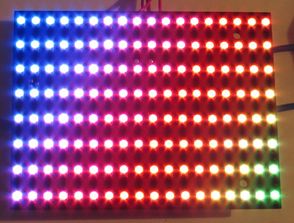BlinkstroemColourEnglish: Difference between revisions
ArneRossius (talk | contribs) No edit summary |
ArneRossius (talk | contribs) No edit summary |
||
| Line 20: | Line 20: | ||
The LED matrix is divided into 18 columns and three times 8 rows (8 each for red, green and blue). The multiplexing is going across the columns from right to left, so only one column is lit at a time. The refresh rate is 100 Hz for the lowest brightness level and increases for the higher brightness levels. The board has to be supplied from an external 5 V power supply capable of at least 0,8 A. | The LED matrix is divided into 18 columns and three times 8 rows (8 each for red, green and blue). The multiplexing is going across the columns from right to left, so only one column is lit at a time. The refresh rate is 100 Hz for the lowest brightness level and increases for the higher brightness levels. The board has to be supplied from an external 5 V power supply capable of at least 0,8 A. | ||
The 3.3  power supply for the SD card is generated either by two silicon diodes in series or a 3,3 V regulator. If the diodes are used, C10A (100 nF) is populated, for the voltage regulator C10B (1 µF) is necessary. R38D is a basic load to prevent the voltage from becoming too high when no SD card is inserted, especially when using the diodes. | The 3.3 V power supply for the SD card is generated either by two silicon diodes in series or a 3,3 V regulator. If the diodes are used, C10A (100 nF) is populated, for the voltage regulator C10B (1 µF) is necessary. R38D is a basic load to prevent the voltage from becoming too high when no SD card is inserted, especially when using the diodes. | ||
* [[:Image:Bsc-rev1.png|Schematic]] | * [[:Image:Bsc-rev1.png|Schematic]] | ||
Revision as of 15:40, 26 July 2013
| project overview | |

| |
| Year | 2013 |
| Number of pixels | 144 |
| Grayscales / Colors | RGB, 83 = 512 colours |
| Illuminant | SMD LEDs |
| Power input | 4 W |
| Contact person | Arne Rossius |
| Project website | |
Blinkström Colour is a BlinkenLights clone that can display full colour animations.
This project uses the BlinkenPlus firmware on an ATmega162 controller. On the PCB there is an SD card slot as well as a level converter and solder pads for an RS232 serial port for streaming input and output.
Hardware
The LED matrix is divided into 18 columns and three times 8 rows (8 each for red, green and blue). The multiplexing is going across the columns from right to left, so only one column is lit at a time. The refresh rate is 100 Hz for the lowest brightness level and increases for the higher brightness levels. The board has to be supplied from an external 5 V power supply capable of at least 0,8 A.
The 3.3 V power supply for the SD card is generated either by two silicon diodes in series or a 3,3 V regulator. If the diodes are used, C10A (100 nF) is populated, for the voltage regulator C10B (1 µF) is necessary. R38D is a basic load to prevent the voltage from becoming too high when no SD card is inserted, especially when using the diodes.
- Schematic
- Schematic (EAGLE file, version 4.16)
- PCB layout (EAGLE file, version 4.16)
- Construction kit instructions